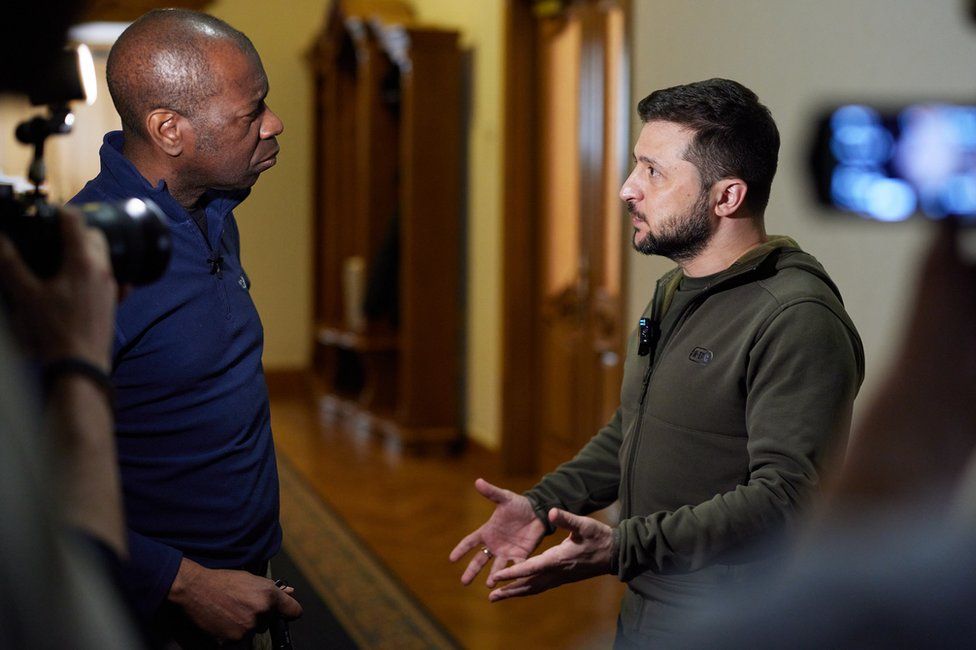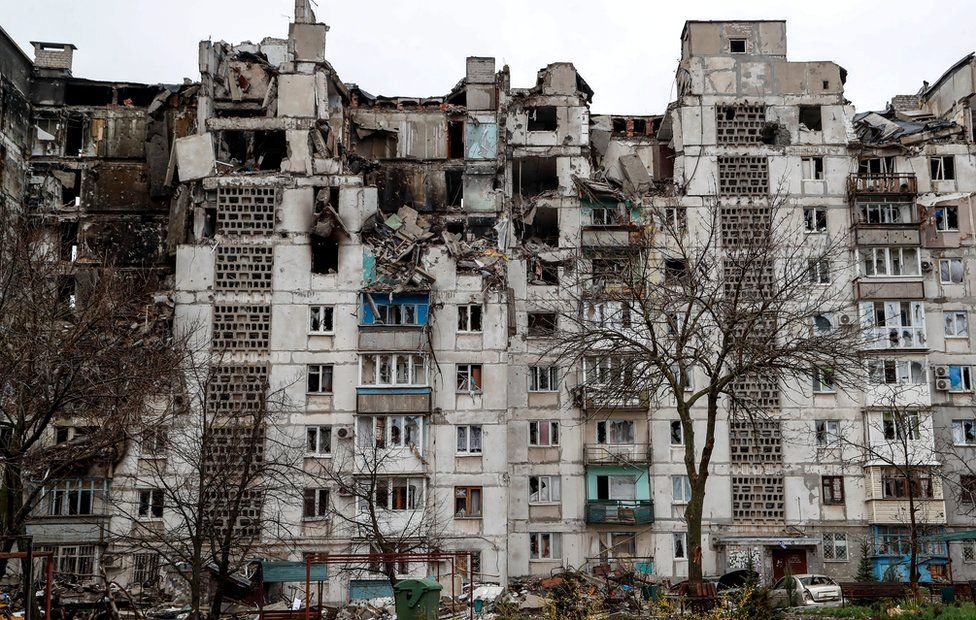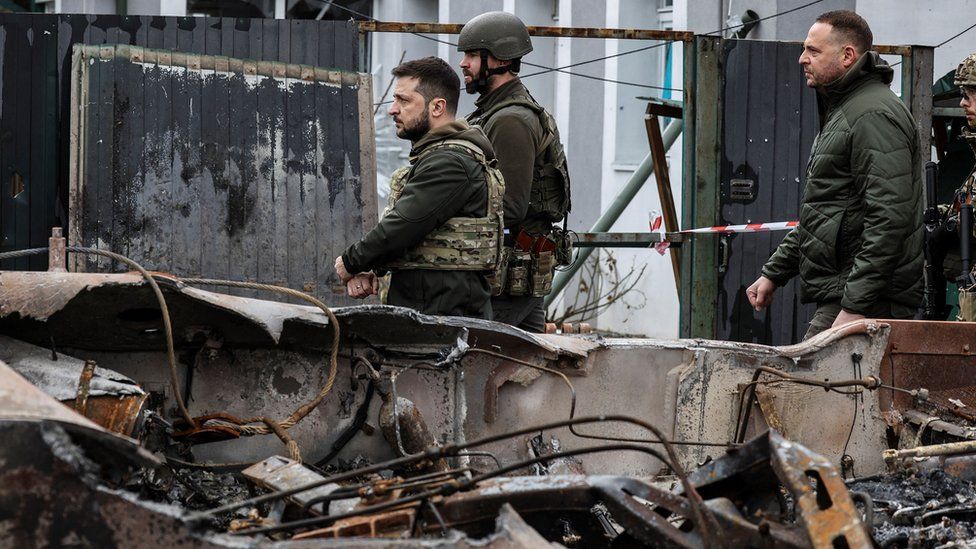Ukraine's President Zelensky to BBC: Blood money being paid for Russian oil
By Clive Myrie and Joel Gunter
BBC News in Kyiv, Ukraine
Ukrainian President Volodymyr Zelensky has accused European countries that continue to buy Russian oil of "earning their money in other people's blood".
In an interview with the BBC, President Zelensky singled out Germany and Hungary, accusing them of blocking efforts to embargo energy sales, from which Russia stands to make up to £250bn ($326bn) this year.
There has been a growing frustration among Ukraine's leadership with Berlin, which has backed some sanctions against Russia but so far resisted calls to back tougher action on oil sales.
"Some of our friends and partners understand that it is a different time now, that it is no longer an issue of business and money," Mr Zelensky told the BBC from his situation room in Kyiv on Thursday. "That it is an issue of survival."
The president also reiterated calls for more weapons to be supplied to Ukraine, saying they were not getting supplies fast enough to fend off Russia's assault.
"The United States, the United Kingdom, some European countries - they are trying to help and are helping," he said. "But still we need it sooner, sooner and faster. The key word is now."

Russian troops have in recent weeks pulled back from around Ukraine's capital, Kyiv, and other central and northern parts of the country - apparently abandoning an attempt to seize all of Ukraine by force.
But there are fears now of a bloody and protracted conflict in the east and south of the country, as Russian President Vladimir Putin refocuses his military campaign there in an effort to seize more territory.
The southern port city of Mariupol - a strategic goal for President Putin - has already been devastated by weeks of Russian artillery bombardment.
President Zelensky told the BBC he thought tens of thousands may have been killed in the city.
"We also have information that as well as those tens of thousands of dead, many have disappeared," he said. "We know their documents have been replaced, they were given Russian passports and taken deep into Russia - some to camps, some to other cities. No one knows what is happening to those people. No one knows how many have been killed."
 REUTERS
REUTERSMr Zelensky said the atrocities apparently committed by Russian troops in Mariupol, and in the Kyiv suburbs of Bucha and Borodyanka, had further narrowed the possibility of peace talks with the Russians.
Hundreds of dead have been found in Bucha since it was taken back by Ukrainian forces a little over a week ago, including civilians who were found shot in the head with their hands tied behind their backs, as well as widespread reports of sexual violence.
"Bucha is in the process of closing [the possibilities of peace talks]," President Zelensky said. "It's not about me - it's about Russia. They will not have many more chances to speak with us."
He said he had "experienced the entire spectrum of emotions" when he visited Bucha last week, but ended the day with "nothing but hatred towards the Russian military". He accused President Putin and the rest of the Russian army "from top to bottom" of being "war criminals".
 GETTY IMAGES
GETTY IMAGESMr Zelensky defended his leadership in the run-up to the Russian invasion that began in February, when his government urged the Ukrainian people to remain calm.
He said the government had been working in the background to agree deals for weapons and supplies, as well as focusing on avoiding panic that could trigger a run on the banks and destabilise Ukraine's economy.
"That was what Russia - and not just Russia - wanted, but we didn't let that happen," he said. "But we did not expect the full-scale invasion when it happened."
Ukraine is now facing a renewed attack in the east and south as Russia attempts to carve off more territory, following its 2014 annexation of Crimea.
President Zelensky said the east now represented the "most difficult situation" for Ukraine's armed forces, "but this is where our most powerful units are concentrated".
"They can destroy us, but we will answer; they can kill but they will also die," he said. "I can't understand for what - I can't understand why they came."
Western sanctions sooooo effective, Russia(continues to buy gold) thinks about going toward return to the gold standard for the first time in over a hundred years
What weapons has Ukraine received from its Western allies?
In this article:
Volodymyr Zelensky
Sixth and current President of Ukraine
Ukrainian President Volodymyr Zelensky sent out another desperate plea on Wednesday to Western countries for more weapons and supplies to “repel Russian forces and stop their war crimes.”
Zelensky has repeatedly asked NATO to impose a no-fly zone over Ukraine in a bid to stop the brutal bombardment from Kremlin-led forces. Although the international alliance has denied Zelensky’s request, Ukraine’s allies have sent billions of dollars in munitions and military assistance. But what has each country promised to deliver, and what has already been sent?
Ukrainian soldiers use a launcher with U.S. Javelin missiles during military exercises in the Donetsk region of Ukraine on Dec. 23, 2021. (Ukrainian Defense Ministry Press Service via AP)
What did the U.S. send?
On Wednesday, President Biden authorized an $800 million military aid package for Ukraine. The shipment includes a wide range of weapons to help Kyiv fight against Russia’s military — the second strongest in the world.
The newly announced assistance has the following:
11 Mi-17 helicopters
18 155mm Howitzers and 40,000 artillery rounds
10 AN/TPQ-36 counter-artillery radars
Two AN/MPQ-64 Sentinel air surveillance radars
300 Switchblade tactical unmanned aerial systems, otherwise known as armed drones
500 Javelin antitank missiles and thousands of other anti-armor systems
200 M113 armored personnel carriers
100 armored Humvees
Unmanned coastal defense vessels
Equipment to protect from chemical, biological, radiological and nuclear contaminants
Medical equipment
30,000 sets of body armor and helmets
Over 2,000 optics and laser rangefinders
C-4 explosives and demolition equipment for obstacle clearing
M18A1 Claymore antipersonnel munition configured to be consistent with the Ottawa Convention
Polish Mi-17 helicopters during Dragon-17 exercises at a military range near Drawsko Pomorskie, Poland, in 2017. (Agencja Gazeta/Cezary Aszkielowicz via Reuters)
American soldiers will also be directly training Ukrainian troops on how to use the more advanced weaponry such as the surveillance radar and the counter-artillery radar. Pentagon press secretary John Kirby has said training may be done by U.S. soldiers in Europe. On Wednesday, the Defense Department said the U.S. “has now committed $3.2 billion in security assistance” to help Ukraine since Biden took office, with $2.6 billion committed since Russia invaded on Feb. 24.
Airmen and civilians from the 436th Aerial Port Squadron palletize ammunition, weapons and other equipment for Ukraine at Dover Air Force Base, Del., on Jan. 21. (Mauricio Campino/U.S. Air Force via AP)
"The Administration is working around the clock to fulfill Ukraine's priority security assistance requests, delivering weapons from U.S. stocks when they are available, and facilitating the delivery of weapons by allies and partners when their systems better suit Ukraine's needs," a Defense Department memo stated earlier this month. The document also gave specific counts of the weapons that have been sent to Ukraine.
This includes:
Over 1,400 Stinger antiaircraft systems
Over 5,000 Javelin anti-armor systems
Over 7,000 other anti-armor systems
Hundreds of Switchblade drones
Over 7,000 small arms
Over 50 million rounds of ammunition
45,000 sets of body armor and helmets
Laser-guided rocket systems
Puma unmanned aerial systems, otherwise known as hand-launched lightweight drones
Four counter-artillery and counter-unmanned aerial system tracking radars
Four counter-mortar radar systems
Armored Humvees
Night vision devices, thermal imagery systems and optics
Tactical secure communications systems
Commercial satellite imagery services
Explosive ordnance disposal protective gear
Medical supplies, including first aid kits
Along with the Pentagon, U.S. civilians have been donating munitions to the Ukrainian defense. One Florida-based company, KelTec, shipped more than $200,000 worth of rifles after a client in Odesa, Ukraine, was no longer in contact. In Colorado, more than 25 state law agencies donated nearly 840 sets of body armor and more than 1,000 helmets.
Adrian Kellgren, director of industrial production of KelTec, with pallets containing rifles being shipped to Ukraine, at the company's manufacturing facility in Cocoa, Fla., on. March 17. (Phelan M. Ebenhack/AP)
What about the U.K.?
Last week, British Prime Minister Boris Johnson said the U.K. would send weapons worth $132 million to Ukraine. British Defense Secretary Ben Wallace confirmed to Sky News that the country would send Mastiff armored vehicles to assist the Ukrainian defense.
A U.K. soldier with a Mastiff armored vehicle during exercises in Salisbury, England, ahead of a deployment to Mali in October 2020. (Leon Neal/Getty Images)
“We will be sending armored vehicles, protective armored vehicles — such as Mastiff — to make sure that Ukraine has that support,” he said. “It’s very important that we do what we can to help Ukraine, and where they ask us for equipment, if we’ve got it or we can help other people provide it, we’ll do that.”
Since January, Britain has sent:
More than 4,000 NLAWs, or next-generation light antitank weapons
Small number of Javelin missiles
Starstreak anti-air missiles
3,000 sets of body armor
2,000 helmets
4,000 boots
Thousands of ear defenders and sleeping mats
What have other countries sent to Ukraine?
According to Politico, more than 25 nations in total have helped to buy and send weapons to Ukraine in response to the Russian invasion. Germany sent 1,000 antitank weapons and 500 Stinger missiles, while the Czech Republic confirmed to Reuters that it had successfully delivered multiple rocket launchers, Howitzers, infantry fighting vehicles and tanks. Defense sources told Reuters that five T-72 tanks and five BVP-1, or BMP-1, infantry fighting vehicles were already spotted in Ukraine, though that was from the first shipments of equipment.
A Ukrainian service member drives a captured Russian T-72 tank in the village of Lukianivka, Ukraine, on March 27. (Serhii Nuzhnenko/Reuters)
Sweden Foreign Minister Ann Linde tweeted in February that Sweden would send “5,000 anti-tank weapons, 5,000 helmets, 5,000 body shields and 135,000 field rations.” Finland, which along with Sweden has remained neutral, made the “historic” decision to supply weapons to Ukraine. Finland said it would send 150,000 rounds of ammunition, 1,500 rocket launchers, 2,500 assault rifles and 70,000 servings of field rations.
Belgium, Portugal and Denmark sent a mixture of automatic rifles, antitank weapons, night-vision goggles and G3 rifles. Slovakia dispatched S-300 air defense systems from its own arsenal, while Estonia confirmed the shipment of nine D-30 122mm towed Howitzers, as well as hundreds of shells. By March 2, Spain had already sent 20 tons of medical and military supplies to Kyiv and confirmed it would send 700,000 munitions, 1,370 grenade launchers and light automatic weapons.
An S-300 air defense missile system launches a missile at the International Army Games near Astrakhan, Russia, in 2017. (Maxim Shemetov/Reuters)
From Turkey, Ukraine received dozens of Turkish-made weapons called Bayraktar TB2 drones. The first shipments of these $2 million drones arrived in Ukraine in 2019, the Wall Street Journal reported. Ukraine’s air force confirmed in the first week of the war that two strikes made against Russian targets were from the drones. In a post on Facebook, the chief of Ukraine’s air force, Lt. Gen. Mykola Oleshchuk, called the weapons “life-giving.” The drones can stay in midair for 24 hours and can reach an altitude of 25,000 feet.
Ukrainian servicemen with a Bayraktar TB2 UCAV at the Kulbakyne aerodrome in Mykolaiv, Ukraine, in June 2021. (Yulii Zozulia/Ukrinform/Future Publishing via Getty Images)
Australian Prime Minister Scott Morrison committed $70 million to Ukraine in missiles and ammunition in early March. “The overwhelming majority of that [$70 million] will be in the lethal category,” Morrison said. “We are talking missiles, ammunition, we are talking supporting them in their defense of their own homeland in Ukraine.” It is unknown what exact weapons were on the list to be given to Ukraine.
_____

.png)

.png)



No comments:
Post a Comment